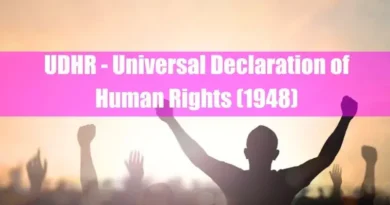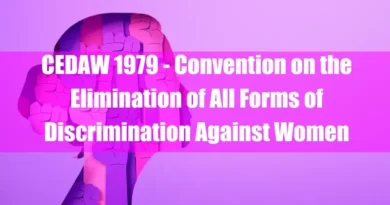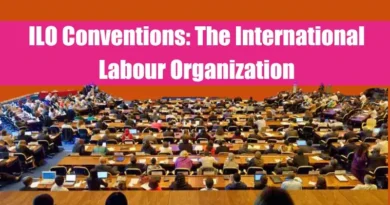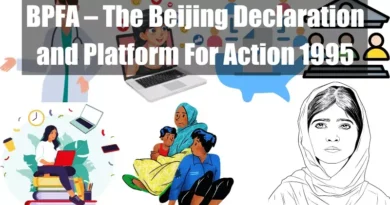ICCPR 1966 – International Covenant on Civil and Political Rights
Takeaways
| Key Points |
|---|
| The International Covenant on Civil and Political Rights (ICCPR), adopted in 1966, is a legally binding treaty that upholds fundamental civil and political rights globally, emphasizing dignity, equality, and autonomy. |
| Rooted in the aftermath of World War II and the Universal Declaration of Human Rights (UDHR), the ICCPR enshrines rights such as life, liberty, freedom from torture, privacy, and freedoms of expression, assembly, and association. |
| It comprises six parts, addressing self-determination, state obligations, specific rights, monitoring mechanisms, and its relationship with other agreements. |
| Core principles include universality, non-discrimination, and the indivisibility of rights, ensuring holistic protection. |
| Article 1 highlights self-determination, enabling peoples to determine their governance and development, though implementation faces challenges like geopolitical tensions. |
| Articles 6, 7, and 26 safeguard life, freedom from torture, and equality before the law, while Articles 14, 15, and 19-22 guarantee fair trials, free expression, assembly, and association. |
| Additionally, Article 17 protects privacy and family life, recognizing their societal importance. |
| Through its provisions, the ICCPR remains a cornerstone in advancing human rights and fostering inclusive democracies worldwide. |
Introduction
The International Covenant on Civil and Political Rights (ICCPR) of 1966 is a foundational treaty adopted by the United Nations General Assembly to protect and promote civil and political rights globally. It establishes essential rights such as the right to life, freedom from torture, equality before the law, and freedoms of expression, assembly, and association, ensuring individuals’ dignity and autonomy.
Ratified by numerous states, the ICCPR is pivotal in the international effort to uphold human rights and democratic governance. It holds states accountable by providing mechanisms for monitoring compliance and addressing violations, reinforcing the rule of law, and protecting fundamental freedoms across diverse cultural and political contexts.
Purpose, Background, and Historical Context

Background and Historical Context
The ICCPR emerged after World War II when the international community, responding to atrocities, recognized the need for a framework to protect human rights. The 1948 Universal Declaration of Human Rights (UDHR) laid the foundation, but a binding treaty was needed. The United Nations then drafted treaties to turn the UDHR’s principles into enforceable rights.
Purpose and Significance of ICCPR
The ICCPR, adopted on December 16, 1966, and in force since March 23, 1976, is part of the International Bill of Human Rights alongside the ICESCR. Unlike the non-binding UDHR, the ICCPR is legally binding, obligating states to uphold civil and political rights, such as the right to life, liberty, and a fair trial.
The ICCPR is a crucial achievement in international law, protecting human dignity and autonomy. Its relevance endures as it safeguards fundamental rights and freedoms in today’s world.
Overview of ICCPR Provisions

General Structure and Organization
The ICCPR comprises six parts, each delineating specific rights and obligations:
- Preamble: Sets forth the foundational principles and objectives of the covenant, emphasizing the inherent dignity and inalienable rights of all individuals.
- Part I – Article 1: Addresses the right to self-determination, allowing all peoples to freely determine their political status and pursue their economic, social, and cultural development.
- Part II – Articles 2 to 5: Outlines the obligations of states to respect and ensure the rights recognized in the covenant without distinction of any kind and establishes the legal framework for these rights.
- Part III – Articles 6 to 27: Enumerates the substantive rights and freedoms protected under the ICCPR, including the right to life, freedom from torture and slavery, the right to liberty and security, fair trial, privacy, freedom of thought, conscience, religion, expression, assembly, and participation in public affairs.
- Part IV – Articles 28 to 45: Establishes the Human Rights Committee (HRC) and outlines the mechanisms for implementing and monitoring the covenant, including procedures for state reporting and individual complaints.
- Part V – Articles 46 to 47: Clarifies the relationship between the ICCPR and other international agreements and addresses the territorial application of the covenant.
- Part VI – Articles 48 to 53: Governs ratification, entry into force, and procedures for amending the covenant.
Key Principles and Rights Guaranteed
At the heart of the ICCPR lie a set of core principles and rights that underpin its entire framework:
- Universality and Inalienability: The rights enshrined in the ICCPR are universal and inherent to all human beings, irrespective of race, nationality, or other status. They cannot be waived or surrendered under any circumstances.
- Non-Discrimination: State parties must ensure equal protection and enjoyment of rights for all individuals within their jurisdiction, without discrimination.
- Progressive Realization: While the ICCPR primarily requires immediate implementation of civil and political rights, state parties are expected to take necessary and appropriate steps to ensure the full realization of these rights over time, considering any limitations that may arise under specific circumstances.
- Interdependence and Indivisibility: Civil and political rights are interdependent and indivisible from economic, social, and cultural rights. The fulfillment of one set of rights is essential for realizing others.
As we navigate the complexities of international human rights law, we must keep these fundamental principles in mind, ensuring a holistic understanding of the rights and obligations enshrined in the ICCPR.
Right to Self-Determination

Definition and Scope of the Right
Article 1 of the ICCPR affirms the right to self-determination, allowing all peoples to determine their political status and pursue their economic, social, and cultural development. This right applies to peoples and collectives, such as nations, indigenous communities, and other groups, emphasizing their ability to choose their governance and economic systems without external interference.
Implementation and Challenges
Although widely recognized, implementing self-determination is often challenging, particularly when it intersects with geopolitical issues, historical grievances, or minority rights. The presence of colonialism, imperialism, and occupation can obstruct this right, as can conflicts within multiethnic states. Despite these challenges, self-determination remains a critical tool for promoting human dignity and resisting oppression.
Note: The right to self-determination does not equate to a right to secession, as international law also upholds the territorial integrity of states.
Civil and Political Rights

Right to Life, Liberty, and Security of Person
Article 6 of the ICCPR unequivocally asserts the inherent right to life, prohibiting arbitrary deprivation of life by state actors. This right encompasses the right to physical existence and to live with dignity and free from violence or coercion. Furthermore, the covenant safeguards a person’s rights to liberty and security, protecting against arbitrary detention and torture or cruel, inhuman, or degrading treatment or punishment.
Freedom from Torture and Cruel, Inhuman, or Degrading Treatment or Punishment
Article 7 of the ICCPR reinforces the absolute prohibition of torture and other forms of cruel, inhuman, or degrading treatment or punishment. It imposes a categorical imperative on state parties to refrain from any act that inflicts severe physical or mental suffering, regardless of the circumstances. This right is non-derogable, meaning it cannot be suspended even in times of emergency or armed conflict.
Equality Before the Law and Non-Discrimination
Article 26 of the ICCPR guarantees equality before the law and prohibits discrimination on various grounds, including race, color, sex, language, religion, political or other opinion, national or social origin, property, birth, or other status. This provision underscores the principle of universality and impartiality in administering justice, ensuring equal protection and treatment under the law for all individuals without distinction.
Right to a Fair Trial and Due Process
Articles 14 and 15 of the ICCPR establish comprehensive safeguards for the right to a fair trial and due process of law. These provisions encompass essential procedural guarantees, such as the right to a competent, independent, and impartial tribunal, the presumption of innocence, the right to be informed of charges promptly, the right to legal representation, and the right to examine witnesses and evidence.
Freedom of Expression, Assembly, and Association
Articles 19 to 22 of the ICCPR safeguard the rights to freedom of expression, assembly, and association, recognizing these as essential pillars of democratic governance and public participation. These rights encompass the freedom to seek, receive, and impart information and ideas without interference or censorship and peacefully assemble and associate with others for various purposes.
Right to Privacy and Protection of the Family
Article 17 of the ICCPR guarantees the right to privacy, protecting personal and family life, home, and correspondence. It safeguards individuals against arbitrary or unlawful interference with their privacy, including surveillance, searches, and intrusions into their private affairs. Additionally, the covenant recognizes the family as the natural and fundamental group unit of society, entitled to protection by society and the state.
As we navigate the complexities of contemporary society, these civil and political rights serve as indispensable safeguards against tyranny, oppression, and injustice.
Upholding these rights ensures individuals’ dignity and autonomy and fosters the flourishing of vibrant and inclusive democracies.
Implementation and Monitoring Mechanisms

Role of the Human Rights Committee
Central to implementing the ICCPR is the Human Rights Committee (HRC), a body of independent experts tasked with monitoring state parties’ implementation of the covenant. Comprising 18 members elected from among individuals of high moral standing and recognized competence in the field of human rights, the HRC reviews state parties’ reports on their compliance with the covenant, offers recommendations and guidance, and considers individual complaints of rights violations.
State Reporting Obligations and Review Process
States parties to the ICCPR must submit periodic reports to the HRC detailing their legislative, judicial, administrative, and other measures taken to give effect to the rights recognized in the covenant. The review process involves a constructive dialogue between the state under review and the HRC, during which the state’s compliance with its obligations is assessed, challenges and achievements are discussed, and recommendations for improvement are made.
Individual Complaints Mechanism
In addition to state reporting, the ICCPR provides an individual complaints mechanism under the First Optional Protocol. It allows individuals to submit complaints (or “communications”) to the HRC alleging violations of their rights under the covenant. Upon receiving a complaint, the HRC conducts a thorough examination, allowing the state concerned to respond and provide relevant information. If the HRC finds a violation, it may issue recommendations and remedies to redress it and prevent its recurrence.
Challenges and Criticisms
Despite the importance of these mechanisms, several challenges and criticisms have been raised regarding their effectiveness and impact:
- Limited Compliance: Some state parties must comply fully with their reporting obligations or implement the HRC recommendations, undermining the effectiveness of the monitoring process.
- Backlog of Cases: The HRC faces a significant backlog of individual complaints, resulting in delays in the consideration and adjudication of cases.
- Lack of Enforcement Mechanisms: The ICCPR needs robust enforcement mechanisms to ensure the implementation of the HRC’s recommendations, relying primarily on moral suasion and diplomatic pressure.
Challenges and Criticisms

Issues of Non-Compliance and Enforcement
Many states fail to fully implement the ICCPR or disregard the Human Rights Committee (HRC) recommendations. This non-compliance undermines the covenant’s credibility and weakens its impact.
Limitations and Gaps in Protection
The ICCPR may not address emerging human rights issues or evolving violations. Its provisions can also be inconsistently applied among states, leading to uneven protection of civil and political rights.
Cultural Relativism and Universalism Debates
The debate between cultural relativism and universalism complicates the implementation of the ICCPR. Some states argue that certain rights in the covenant should be interpreted within cultural contexts, leading to conflicts between different human rights approaches.
Addressing these Challenges
- Strengthening Compliance Mechanisms: States must take proactive measures to comply with the ICCPR, including legislative reforms and effective monitoring.
- Enhancing Awareness and Education: Raising awareness of civil and political rights among citizens, civil society, and government officials is crucial for fostering respect for human rights.
- Promoting Dialogue and Cooperation: Encouraging dialogue and cooperation among states, civil society, and international bodies can help address challenges and improve implementation.
Despite its challenges, the ICCPR remains essential for protecting civil and political rights globally. Addressing these issues through dialogue and cooperation is key to realizing the covenant’s full potential.
Future Perspectives and Conclusion

Potential for Strengthening ICCPR
Looking ahead, there is significant potential for strengthening the implementation and enforcement mechanisms of the ICCPR to protect civil and political rights better. This may involve enhancing the capacity and independence of the Human Rights Committee (HRC), streamlining reporting processes, and bolstering measures to hold state parties accountable for rights violations.
Furthermore, efforts to promote ratification and accession to the ICCPR by states that still need to do so can expand the treaty’s reach and impact, ensuring that more individuals benefit from its protections.
Importance of Upholding Civil and Political Rights
The importance of upholding civil and political rights cannot be overstated in today’s world, where authoritarianism, discrimination, and repression continue to threaten the fabric of democracy and freedom. By safeguarding these rights, we not only protect the dignity and autonomy of individuals but also foster the conditions necessary for vibrant democracies, rule of law, and inclusive societies to flourish.
Let us strive towards a world where everyone can exercise their rights and freedoms, regardless of their circumstances or location. In the end, each of our collective efforts will unlock the potential of the ICCPR and ensure a brighter future for generations to come.
FAQ
What is the ‘Right to Self-Determination’ as recognized in the ICCPR?
The ‘Right to Self-Determination’ is enshrined in Article 1 of the ICCPR, affirming that all peoples can freely determine their political status and pursue economic, social, and cultural development. This principle underscores people’s autonomy to shape their destinies without external interference.
How does the ICCPR define ‘Non-Discrimination’?
‘Non-Discrimination’ in the ICCPR mandates that rights recognized in the covenant must be ensured without distinction of any kind, such as race, color, sex, language, religion, political or other opinion, national or social origin, property, birth, or other status. This principle ensures equal protection under the law for all individuals.
What does ‘Derogation’ mean in the context of the ICCPR?
‘Derogation’ refers to the temporary suspension of certain obligations under the ICCPR by a state during times of public emergency that threaten the nation’s life. However, even in such situations, certain rights, like the right to life and freedom from torture, are non-derogable and must be upheld.
Can you explain ‘Freedom from Torture’ as per the ICCPR?
Article 7 of the ICCPR explicitly prohibits torture and cruel, inhuman, or degrading treatment or punishment. This absolute right ensures that no individual is subjected to severe physical or mental pain or suffering, irrespective of circumstances.
What is meant by ‘Arbitrary Arrest and Detention’ under the ICCPR?
The ICCPR safeguards individuals against ‘Arbitrary Arrest and Detention,’ ensuring that no one is deprived of their liberty except on grounds established by law and following proper legal procedures. This protection is vital for maintaining personal freedom and security.
How does the ICCPR protect ‘Freedom of Movement’?
‘Freedom of Movement’ under the ICCPR guarantees that individuals lawfully within a state’s territory have the right to move freely and choose their residence. It also encompasses the right to leave any country, including one’s own, and to return to one’s country.
What is ‘Freedom of Thought, Conscience, and Religion’ in the ICCPR?
This freedom, protected by the ICCPR, allows individuals to hold or adopt beliefs of their choice and to manifest their religion or beliefs through worship, observance, practice, and teaching, either individually or in community with others, publicly or privately.
How does the ICCPR define ‘Freedom of Expression’?
‘Freedom of Expression’ under the ICCPR encompasses the right to seek, receive, and impart information and ideas of all kinds, regardless of frontiers, either orally, in writing, in print, through art or by other means. This right is essential for a democratic society.
What does ‘Peaceful Assembly’ entail according to the ICCPR?
The ICCPR recognizes the right of individuals to assemble peacefully. This means people can gather for peaceful purposes without interference, subject to certain restrictions necessary in a democratic society for national security, public safety, public order, protection of public health or morals, or the rights and freedoms of others.
Can you explain ‘Freedom of Association’ as per the ICCPR?
‘Freedom of Association’ in the ICCPR ensures individuals have the right to associate with others, including forming and joining trade unions, to protect their interests. This right supports collective action and the functioning of a pluralistic society.
Under the ICCPR, what is the ‘Right to Participate in Public Affairs’?
The ICCPR guarantees every citizen the right to participate in public affairs, directly or through freely chosen representatives. It also includes the right to vote and be elected at genuine periodic elections, ensuring democratic governance.
How does the ICCPR address ‘Minority Rights’?
The ICCPR protects the rights of ethnic, religious, or linguistic minorities to enjoy their own culture, profess and practice their own religion, and use their own language. This provision ensures the preservation and promotion of minority identities.
What is the ‘Right to Life’ as protected by the ICCPR?
Article 6 of the ICCPR recognizes the inherent right to life of every human being, stipulating that this right shall be protected by law and that no one shall be arbitrarily deprived of life. It forms the foundation for all other human rights.
Can you define ‘Forced Disappearance’ in the context of the ICCPR?
While the ICCPR does not explicitly mention ‘Forced Disappearance,’ such acts involve the arrest, detention, or abduction of individuals by state agents or with state authorization, followed by a refusal to acknowledge the deprivation of liberty or concealment of the individual’s fate, placing them outside legal protection.
How does the ICCPR ensure ‘Equality Before the Law’?
The ICCPR mandates that all individuals are equal before the law and are entitled, without discrimination, to equal protection of the law. This principle ensures that laws are applied impartially and protect all individuals equally.
IX. Citation
International Covenant on Civil and Political Rights. (n.d.). OHCHR. https://www.ohchr.org/en/instruments-mechanisms/instruments/international-covenant-civil-and-political-rights









